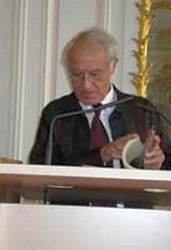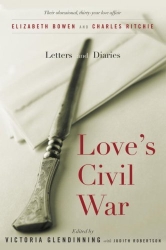|
|
Documenting the quest to track down everything written by
(and written about) the poet, translator, critic, and radio
dramatist, Henry Reed.
An obsessive, armchair attempt to assemble a comprehensive
bibliography, not just for the work of a poet, but for his
entire life.
Read " Naming of Parts."
|
Contact:
|
|
|
|
Reeding:
|
 |
I Capture the Castle: A girl and her family struggle to make ends meet in an old English castle.
|
 |
Dusty Answer: Young, privileged, earnest Judith falls in love with the family next door.
|
 |
The Heat of the Day: In wartime London, a woman finds herself caught between two men.
|
|
|
|
Elsewhere:
|
|
Posts from March 2010
|
|
|
27.4.2024
|
Our constant friend, Bruce, directs us to a lecture by Professor Jon Stallworthy, speaking at the Teaching World War I Literature Conference, held at Oxford University Computing Services, in November of 2007. The conference was convened (according to Stallworthy) in order to discuss the teaching of First World War literature in secondary and tertiary education, with special reference to three topics: 1) The relevance, today, of the poetry of the Great War, 2) whether the canon of that poetry should be extended, and 3) the wider topic of war poetry, and how the poems of the Great War should fit into that category.

Stallworthy argues that society today is suffering from a sort of "trench-tunnel vision," and that our collective newsreel seems to be "jammed at the Somme, in 1916." He makes the case that the current curriculum could be benefited if it "replaced some of the weaker poets of the First World War with some of the stronger poets of the Second," and he goes on to outline such a syllabus, to include: the call to arms for poets during the Spanish Civil War; the American poets; poems by veterans; and, specifically, the work of John Balaban, a conscientious objector who was in Vietnam during the Tet Offensive. The talk is about 30 minutes long:
Professor Jon Stallworthy, Teaching World War One Literature
Amusingly, at several points during his presentation, Stallworthy is compelled to admit that he, himself, is at least partly to blame for the continuing over-emphasis on and popularity of First World War poetry.
There also appears (at about 7:15) an amazing mention of a failed proposal to install a plaque at Poet's Corner for the poets of World War II, including Henry Reed. Stallworthy says:
How often have we all had to ask the question, 'Why, when there was so much marvelous poetry from the First World War, was there none from the Second?' The double misperception can only be the fault of an educational system that over-values the one, and is ignorant of the second.
If you doubt the accuracy of that statement, consider these facts: First, that in Poet's Corner of Westminster Abbey, a stone commemorating the poets of the Great War carries the names of Laurence Binyon, Wilfred Gibson, Robert Nichols, and Herbert Read, among others. Second, that the Dean of Westminster and his advisors have rejected a proposal that a similar stone, commemorating voices from the Second World War, should be erected to carry the names of four much better poets (of whom I'll have more to say, later): Keith Douglas, Sidney Keyes, Alun Lewis, and Henry Reed.
Curiously, I can't find any other references to the proposed memorial for World War II poets. That would be a big deal! Do you know anything about it?
Professor Stallworthy's talk is archived on the " Podcasts" page of The First World War Poetry Digital Archive. (And he is in good company, with Tim Kendall presenting a paper on Ivor Gurney, just below!)
|
1537. Radio Times, "Full Frontal Pioneer," Radio Times People, 20 April 1972, 5.
A brief article before a new production of Reed's translation of Montherlant, mentioning a possible second collection of poems.
|
Novelist and biographer of Elizabeth Bowen, Victoria Glendinning, continues to provide new details of how Henry Reed was perceived by his contemporaries, and his visit to Ireland in the spring of 1946. I have covered here, previously, how Reed spent two weeks at Bowen's Court, Elizabeth Bowen's ancestral home in County Cork. Now, in a recent collection of letters and diary entries by Bowen and her long-time lover, Charles Ritchie, Love's Civil War (Toronto: McClelland & Stewart, 2008, with Judith Robertson), we are privileged to discover more about how Reed's visit came about.
Star-crossed and married to other people, some context for Bowen and Ritchie's relationship is provided on the collection's front flap:
The love affair between the writer Elizabeth Bowen and the elegant and charming Canadian diplomat Charles Ritchie blossomed quickly after their first meeting in 1941 and continued over the next three decades until Bowen's death in 1973. Theirs was a passion that flourished in the heightened, dangerous atmosphere of wartime London that Bowen wrote about so vividly in her novels. When Ritchie's diplomatic career took him further afield — to Paris, Bonn, New York and Ottawa — the lovers wrote to one another continuously, sharing their hopes and fears, their boundless affection for one another, and their longing to be together again. Published for the first time in this exquisite volume, accompanied by extracts from Ritchie's remarkably candid diaries, the love letters of Elizabeth Bowen reveal a passionate, intelligent, eloquent, strong-minded and wonderfully funny woman. They also reveal a man bewitched by her writer's mind and imagination, and by her adoring vision of him as a greater man than he ever felt himself to be.
More details about Bowen and Ritchie in this Guardian review.
Henry Reed and Michael Ramsbotham traveled to Ireland in the spring of 1946, to celebrate Ramsbotham's demobilization from military service. While it's unclear if they traveled separately, or if perhaps Ramsbotham was already in Ireland at the time, in Bowen's letter we find Reed alone in Dublin, when he inquired if he might pay a visit. Bowen was already aware of Reed, as he had reviewed her collection of short stories, The Demon Lover, for The New Statesman in November of 1945. Bowen wrote to Ritchie:
Bowen's Court, Kildorrey, Monday, 20th May 1946
My darling....
The world of letters has followed me here in the person of Henry Reed, one of those young men who write for the New Statesman. He was staying in Dublin and asked if he could come here. He is one of those fascinating homosexual characters, and a very good poet — has just published a book of poems called Map of Verona. He comes from Birmingham and is of lower-middle-class origin, but has romantic aristocratic views. His boy friend, a gentle creature whom I met in London, is lurking in some other part of Ireland, waiting about for him, so I said he had better come here too: they had had some notion of a tryst in Killarney, but Henry did not seem very enthusiastic about that, and as he evidently prefers to stop here I think he had better have his friend with him. He is very good company (I mean Henry) and does not interfere with me, as he regards it as essential that I should get on with my novel. So if the boy friend, who is at present preserving a moody silence, can be traced, they are to forgather here. I wish I had Anne-Marie's [Romanian Princess Callimachi, in exile] passion for intervening in masculine love affairs, but I haven't.[...] Love from E.
[p. 91]
So, Bowen was already acquainted with Ramsbotham, as well! And we see what might be construed as the beginnings of civil war in Reed's relationship with Ramsbotham, which would only last until 1950. At the time of this letter, Bowen was writing The Heat of the Day (London: Jonathan Cape, 1949), her novel on wartime London.
In addition to her work on Bowen, Victoria Glendinning has published biographies on Vita Sackville-West, Edith Sitwell, Jonathan Swift, Anthony Trollope, Rebecca West, and Leonard Woolf. Love's Civil War has just been re-released in paperback.
|
1536. L.E. Sissman, "Late Empire." Halcyon 1, no. 2 (Spring 1948), 54.
Sissman reviews William Jay Smith, Karl Shapiro, Richard Eberhart, Thomas Merton, Henry Reed, and Stephen Spender.
|
Did you know Henry Reed's play, Return to Naples, was part of the same radio series that produced Dylan Thomas's Return Journey to Swansea?
According to Peter Lewis, in his chapter on Dylan Thomas in British Radio Drama (Drakakis, ed., 1981), "The Radio Road to Llareggub," the feature series Return Journey consisted of twenty-four episodes broadcast on the Home Service and Third Programme between 1945 and 1951 (p. 92). In The Growth of Milk Wood (1961), Douglas Cleverdon says the series was originally devised by the BBC Features Department
in order to lure writers of distinction into the radio field; they were commissioned to return to their native town, or to some other place that had powerful associations for them, and to write a programme about it, in the form of a semi-autobiographical talk interspersed by dramatized flashbacks, extracts from journals, actual recordings—anything, in fact, that might illuminate the theme. [p. 15]
Scanning the broadcasting schedules in The Times for those years finds these episodes:
- Eric Linklater to the Orkneys (October 31, 1945)
- John and Rosamond Lehmann on the Isle of Wight (April 13, 1946)
- Palace Court, Bayswater, revisted by Sir Francis Meynell and Viola Meynell (September 2, 1946)
- V.S. Pritchett, Return to the Fells (October 13, 1946)
- Edward Sackville-West to Knole (April 9, 1947)
- Dylan Thomas to Swansea (June 15, 1947)
- Stevie Smith to Syler's Green (August 5, 1947)
- Rayner Heppenstall to Strasbourg (September 16, 1948)
- Sean O'Faoláin to Cork (November 20, 1948)
- Christopher Sykes to Berlin (February 19, 1949)
- Henry Reed, Return to Naples (August 17, 1950)
W.R. Rodgers apparently also wrote for Return Journey, though I can't find the title. Mountpottinger, Belfast, perhaps? Several programs were produced by Stephen Potter, and the series was originally conceived by R.D. "Reggie" Smith.
|
1535. Reed, Henry. "Talks to India," Men and Books. Time & Tide 25, no. 3 (15 January 1944): 54-55.
Reed's review of Talking to India, edited by George Orwell (London: Allen & Unwin, 1943).
|
|
|
|
1st lesson:
Reed, Henry
(1914-1986). Born: Birmingham, England, 22 February 1914; died: London, 8
December 1986.
Education: MA, University of Birmingham, 1936. Served: RAOC, 1941-42; Foreign Office, Bletchley Park, 1942-1945.
Freelance writer: BBC Features Department, 1945-1980.
Author of:
A Map of Verona: Poems (1946)
The Novel Since 1939 (1946)
Moby Dick: A Play for Radio from Herman Melville's Novel (1947)
Lessons of the War (1970)
Hilda Tablet and Others: Four Pieces for Radio (1971)
The Streets of Pompeii and Other Plays for Radio (1971)
Collected Poems (1991, 2007)
The Auction Sale (2006)
|
Search:
|
|
|
Recent tags:
|
Posts of note:
|
Archives:
|
Marginalia:
|
|









